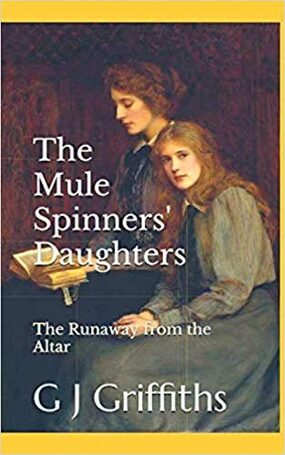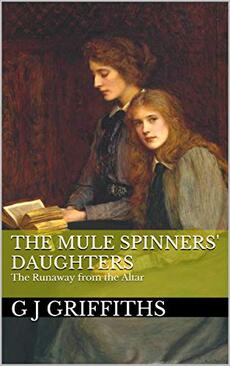In 1806 two boy apprentices, Thomas and Joseph, ran away from the cotton mill owned by Samuel Greg in Styal, Cheshire. They somehow made their way, on foot, to London which is about 200 miles from Quarry Bank Mill. Eventually they were caught and appeared in Middlesex Assizes courtroom where they each made a statement, the record of which is still used today during school and adult tours of the cotton mill. The tale of their journey is related in book 1, The Quarry Bank Runaways.
The next phase in their story appears in book 2, Mules; Masters & Mud and this relates the next 30 years of their lives. This includes events that happened around the Peterloo Massacre of 1819, and also the obstacles that stood in the way of each young man when they tried to move out of the cotton 'sweat shops' of the Industrial Revolution and into a different way of working. Tommy and Joe find true love and happiness and go on to have children of their own.
Book 3, The Mule Spinners' Daughters, is now available and tells the story of Sally and Catherine, young women with independent minds of their own. They are troubled by men that they meet who wish to be suitors, and who may have the domineering attitudes that seemed to be common amongst males during Victorian Britain. There is an additional complication of religious beliefs, through a group known as the Christian Israelites, that threatens to cause a split between families and even lovers. Can love resolve all their problems?
CLICK THE LATEST BOOK COVERS FOR LINKS TO USA AND HERE FOR THE UK.
Much earlier that day the Priestley family had travelled by coach from Stockport to Leek and, apart from an old gentleman sat in the corner, they occupied all of the seats. Thomas Priestley, his wife, Milly, and their three children, Cathy, Jack and Rachel, were attending Gabriel’s funeral. They were warmly considered as near relatives by the Seftons, having been known to Ellie and Esther for very many years. Thomas’ general store in Stockport was doing well, and had been steadily expanding its range of goods. It was often frequented by members of the local gentry ever since Thomas and Milly had begun to specialise in the new patterns of coloured dress silks as well as the new drapery and furnishing fabrics. This had been made possible by the introduction of Jacquard looms in some of the mills with which Thomas had long had contact. When setting up his shop, years ago, he had originally collected cotton waste in order to trade it with mills that spun yarn suitable for cheaper bed covers and candle wicks. Thomas had once been a skilled mule spinner for Quarry Bank mill and could easily recognise a yarn’s quality, good or bad, when he saw it.
The dramatic changes in the shop’s fortunes were exciting for all the Priestley family. Milly and their eldest daughter, Cathy, had to supress their enthusiasm a little under the sad circumstances but felt certain that the Sefton women would be curious to hear about the new brocades and damask fabrics that they now stocked. This was in contrast to the sombre mourning black that Ellie and Esther had been sewing and altering for Gabriel’s funeral. Thomas had supplied the original black material for Joseph’s funeral at much less than cost in an effort to soften the blow. He had felt so ‘useless’ at the time and, having been present in the room when his old friend had passed away, it was all he could think of to try and help.
“Can I show Sally my new dress afterwards, Ma?”
“Not straight away, Rachel,” replied Milly gently. “Everyone is bound to be feeling very sad and upset.”
“But I brought it specially to show her and Aunty Ellie. Thou said I could,” she whined.
Before Milly had a chance to speak Jack spoke up, “Don’t be such an impatient Poll. Gabriel’s died. That’s why we’re going to see them. Or had thou forgotten so soon? Thou’s just a little noddle head!”
The old gentleman cleared his throat and rustled his newspaper, frowning over the top at Rachel, spectacles clinging to the end of his large red nose. The young girl smiled sweetly but had no response from the man other than a loud Harrumph! Rachel’s lips changed immediately to a downward glum turn with her big blue eyes casting their look to her feet.
“Ma, tell Jack,” she grumbled. “He’s being so horrible to me.”
A very big sigh and a glare from Thomas was the signal to end the arguing between the children. He glanced at Milly opposite him who shook her head at her teenage son and then turned to Rachel again.
“You must be more patient, my dear, and remember this is a very, very sad time for everyone.”
“But I hardly knew Gabriel,” replied Rachel. “So…”
Cathy took hold of her little sister’s hand gently and whispered to her. “But we all did, Rachel, and it is one of the saddest things to ever have happened. As sad as when our pa lost his arm at Peterloo. And as thou knows so well, we were not even born then – none of the three of us. But still we find the thought of that, so, so sad.” She touched her eyes with a handkerchief at her own words and Rachel nodded solemnly.
“Sorry, Ma; sorry, Pa,” she whispered. At the mention of Peterloo the old man’s eyebrows were raised as he glanced at Thomas, and he sank down behind his rustling newspaper once again where he quietly remained for the rest of the journey, apart from intermittent sighs and harrumphs.



 RSS Feed
RSS Feed

